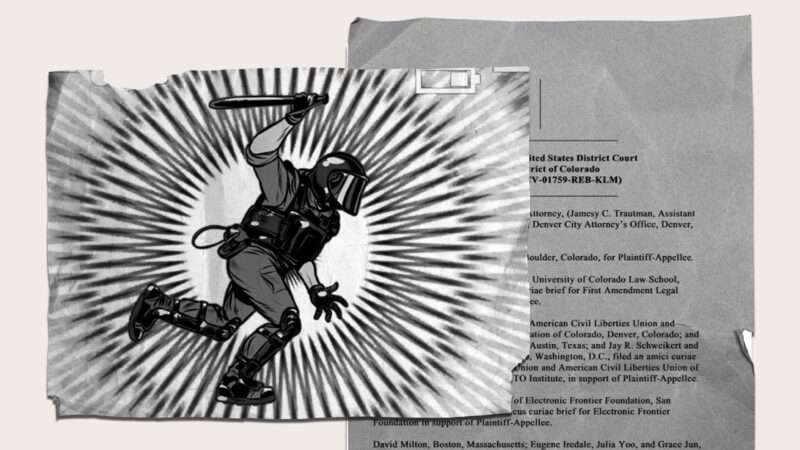
The Supreme Court has just refused to hear a case at the nexus of the First Amendment and police abuse, declining to hear a petition from a man who says his free speech rights were violated when a group of cops searched his tablet without a warrant and attempted to delete a video he took of them beating a suspect.
Officers with the Denver Police Department (DPD) cornered Levi Frasier in the summer of 2014 after they noticed he had recorded an altercation moments prior. The video showed a cop punching a suspect in the face six times while executing an arrest over an alleged drug deal—the man had a sock in his mouth that the cops thought was contraband—and it captured a different officer throwing a woman to the ground by her ankle when she approached the scene screaming. Upon noticing Frasier, DPD Officer Russell Bothwell shouted “Camera!” and the group proceeded to harass him for the footage. Frasier says the police implied they would jail him if he refused to produce the clip. “Well, we could do this the easy way or we could do this the hard way,” Officer Christopher L. Evans reportedly said, pointing to his squad car. Despite Frasier’s protestations, the police then confiscated the tablet and went through it without the owner’s permission.
Those officers were given qualified immunity, a legal doctrine that allows a slew of state actors to infringe on your rights if the way they went about doing so has not specifically been ruled unconstitutional by the Supreme Court or the same federal circuit. It’s a granular standard that has seen government officials get off for assaulting and arresting a man for standing outside of his own home, for shooting and killing a man who had been sleeping in his car, for beating a man after pulling him over for broken lights, for leaving an innocent man’s home in ruins after conducting a SWAT raid on the wrong house, and for stealing hundreds of thousands of dollars. Without a prior ruling with identical facts, the victims in the above scenarios were not allowed to state their claims before a jury.
That standard is particularly egregious here, because the DPD enacted a policy in 2007 informing officers that the public has a constitutional right to film them on duty. But that wasn’t good enough, according to the U.S. Court of Appeals for the Tenth Circuit, which ruled in March that the only permissible avenue for overcoming qualified immunity is to find that perfect court precedent.
“Judicial decisions are the only valid interpretive source of the content of clearly established law; whatever training the officers received concerning the First Amendment was irrelevant to the clearly-established-law inquiry,” wrote Judge Jerome A. Holmes of the U.S. Court of Appeals for the 10th Circuit. With the high court’s rejection today, that ruling will remain intact.
The rationale for qualified immunity is that officials should be free from vacuous lawsuits and thus deserve to be put “on notice” as to what is and is not constitutional behavior. From the 10th Circuit’s opinion, we are to deduce that obscure court precedents are more valuable at accomplishing that end than a department’s own stated policies, even though one would expect most government employees to be more familiar with the latter than the former.
Those training guidelines will now “somewhat lose their force,” says Anya Bidwell, an attorney at the Institute for Justice, a public interest firm. Cops have less reason to follow department rules if they know the federal courts will decline to hold them accountable for breaking those very rules. In shielding a group of rogue government employees, the court inadvertently weakened the public’s First Amendment rights.
“What’s particularly stunning here is that the people who wrote the training were able to correctly synthesize the law and conclude that the officers’ actions violated [a] constitutional right,” says Ari Cohn, free speech counsel at TechFreedom, an advocacy group focused on the intersection of technology and the First Amendment. “To rule that qualified immunity protects them, even though the department correctly pieced together the clearly established law to train them that such conduct is unlawful, simply because a court hadn’t ruled on that particular fact pattern, is extreme judicial hubris.”
The 1st, 3rd, 5th, 7th, 9th, and 11th Circuits have all acknowledged a First Amendment right to film the police. Had those officers misbehaved in a location subject to one of those federal circuit courts, they would not have been so lucky.
And while the 10th Circuit acknowledged that DPD training invoked a constitutional right to film the police, the court danced around coming to any conclusion on that subject. “We do not consider, nor opine on, whether Mr. Frasier actually had a First Amendment right to record the police performing their official duties in public spaces,” Holmes wrote, leaving officers in that jurisdiction free to violate the public’s rights in the same way again without fear of recourse.
from Latest – Reason.com https://ift.tt/3CDFlsy
via IFTTT